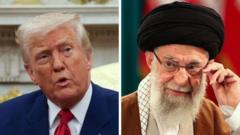**The rescheduling highlights challenges in US-Iran relations and the impact of recent sanctions.**
**Iran-US Nuclear Talks Postponed Amid Rising Tensions**

**Iran-US Nuclear Talks Postponed Amid Rising Tensions**
**Upcoming negotiations on Iran's nuclear activities face delays due to logistical issues, as tensions escalate over regional conflicts.**
In a notable development, the fourth round of negotiations between Iran and the United States regarding Tehran's nuclear program has been postponed. Oman's foreign minister, tasked with facilitating these discussions, announced that talks originally scheduled to take place in Rome would be rescheduled, emphasizing that a new date would be determined collaboratively by all involved parties.
The delay follows warnings from US Secretary of Defense Pete Hegseth earlier this week, where he stated that Iran would face serious repercussions for its continued support of Yemen's Houthi rebels. Additionally, the US government has imposed sanctions targeting companies allegedly linked to Tehran, further straining relations.
Former President Donald Trump’s administration withdrew the US from a landmark nuclear agreement with Iran and five other nations in 2018, aiming to negotiate what they described as a "better" deal. Trump has consistently suggested a military response if negotiations do not yield satisfactory results, underlining the high stakes involved. The initial talk sessions, held in Muscat, received a relatively positive reception, as both sides labeled them as “constructive.”
Iran's foreign ministry confirmed the postponement, while the US has refrained from making an official statement on the matter. A report from an anonymous US official suggested that Washington had never guaranteed its attendance for the fourth round, indicating a potential lack of consensus on scheduling.
Despite the delay, analysts believe that the negotiations are not entirely stalled, as both nations aim to prevent a military conflict. However, reports from Tehran have indicated skepticism regarding the effectiveness of the talks, particularly in light of new sanctions and perceived inconsistencies from the US delegation.
The sanctions imposed on Iran by the US are part of a "maximum pressure" strategy, designed to curb the country’s nuclear ambitions and regional influence. US officials continue to assert that Iran fuels instability across the Middle East, as they seek to disrupt the flow of funding to malign activities linked to the Iranian regime.
While Trump has advocated for a solution that prevents Iran from building nuclear weapons, differing opinions within his administration suggest a desire for the complete dismantlement of Iran’s enrichment capabilities. In contrast, Iran maintains its nuclear pursuits are peaceful and seeks arrangements that would offer relief from sanctions without fully abandoning its enrichment rights.
The complex dynamics involved indicate that navigating a successful outcome will require both diplomacy and concessions, as Iran remains one of the most sanctioned nations globally after Russia.
The delay follows warnings from US Secretary of Defense Pete Hegseth earlier this week, where he stated that Iran would face serious repercussions for its continued support of Yemen's Houthi rebels. Additionally, the US government has imposed sanctions targeting companies allegedly linked to Tehran, further straining relations.
Former President Donald Trump’s administration withdrew the US from a landmark nuclear agreement with Iran and five other nations in 2018, aiming to negotiate what they described as a "better" deal. Trump has consistently suggested a military response if negotiations do not yield satisfactory results, underlining the high stakes involved. The initial talk sessions, held in Muscat, received a relatively positive reception, as both sides labeled them as “constructive.”
Iran's foreign ministry confirmed the postponement, while the US has refrained from making an official statement on the matter. A report from an anonymous US official suggested that Washington had never guaranteed its attendance for the fourth round, indicating a potential lack of consensus on scheduling.
Despite the delay, analysts believe that the negotiations are not entirely stalled, as both nations aim to prevent a military conflict. However, reports from Tehran have indicated skepticism regarding the effectiveness of the talks, particularly in light of new sanctions and perceived inconsistencies from the US delegation.
The sanctions imposed on Iran by the US are part of a "maximum pressure" strategy, designed to curb the country’s nuclear ambitions and regional influence. US officials continue to assert that Iran fuels instability across the Middle East, as they seek to disrupt the flow of funding to malign activities linked to the Iranian regime.
While Trump has advocated for a solution that prevents Iran from building nuclear weapons, differing opinions within his administration suggest a desire for the complete dismantlement of Iran’s enrichment capabilities. In contrast, Iran maintains its nuclear pursuits are peaceful and seeks arrangements that would offer relief from sanctions without fully abandoning its enrichment rights.
The complex dynamics involved indicate that navigating a successful outcome will require both diplomacy and concessions, as Iran remains one of the most sanctioned nations globally after Russia.






















